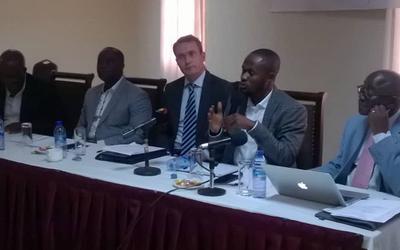- Home
Policy inconsistencies bane of Ghana’s energy crisis - Experts
Nov. 7, 2017
Chief Executive Officer (CEO) of the Institute of Green Growth Solutions (IGGS), Dr. Eric Twum, has revealed that policy inconsistencies is the reason for Ghana’s energy crisis.
According to him, what governments both past and present have sought to do in an attempt to solve the energy crisis have all been the usual fire-fighting approach to crisis but had not taught through policies to prevent the crisis in the first place.
The CEO of IGGS made the revelation at the third energy sector policy engagements forum on the theme: “Ensuring a Sustainable and Efficient Power Sector.”
It was held at the plush Coconut Grove Regency Hotel in Accra.
Dr Twum explained that the energy sector policy engagements forum which started policy discussions about three years ago had not only influenced some of the immediate policy actions that were taken by the government to end the frequent power outages, but has also marked the beginning of what has become an amazing and enduring partnership with the Konrad Adenauer Stiftung.
“…even as I look back at what necessitated these discussions in the first place, I cannot help but ask: “Are we out of the woods yet?”
“Are the dark days over?” …or to put it in rather plain language, “is dumsor over?,” he asked.
“While we have unfortunately made the energy discussion a dumsor one over the last few years, ladies and gentlemen, it is only an indication of the rather, to borrow Al Gore’s statement, ‘inconvenient truth’ that we have only been doing firefighting when our mandate is to prevent the fire in the first place,” Dr Twum reiterated.
The CEO of IGGS further explained that the country’s focus on dumsor over the years has been similar to someone taking painkillers for headache when in fact; the headache is only a symptom of an ailment that is not being treated.
“Our ailment has been unsustainability, unsustainable financing, unsustainable generation and distribution, unsustainable power sector institutions coupled with inefficient and poor management, unsustainable management of the sector which result in unacceptable financial and generation losses and policy inconsistencies,” he added.
Another problem affecting the sector, he added, was the huge debts incurred by the power producers and distributors.
“This is what it really means; energy sector debt represents a significant proportion of the balance sheet of commercial banks, which means money that should be lent to the private sector for income generation activities and employment creation is locked up in one sector. The unsustainability of the sector compounds the problem for the private sector even more in the form of high operational costs, which further constraints the employment generation capacity of the private sector,” Dr Twum indicated.
“Just last week, government went to the bond market for the first of two issues targeted at raising 6 billion Ghana cedis to defray the energy sector debt. Inasmuch as this is an action I applaud, the truth is, it is once again, another firefighting effort.
The question we should be asking is: how did we accumulate all that debt? Are the investments that were made able to service these debts in the long-term? Do they even provide value for money to start with?…. this is how we ensure long term sustainability—by asking ourselves the questions that need to be asked, being frank with ourselves, and being brave enough to do what needs to be done,” he noted.
Source: http://www.todaygh.com/policy-inconsistencies-bane-ghanas-energy-crisis-experts/

-
Aug. 1, 2022
-
Oct. 29, 2018
-
Aug. 24, 2018
-
Nov. 20, 2017
-
Nov. 13, 2017
-
Aug. 28, 2019
9 a.m. - 5 p.m. -
Aug. 23, 2018
8:30 a.m. -
Oct. 31, 2017
9 a.m. - 3 p.m. -
March 17, 2017
10 a.m. - 3 p.m. -
July 14, 2016
9 a.m. - 2:30 p.m.


